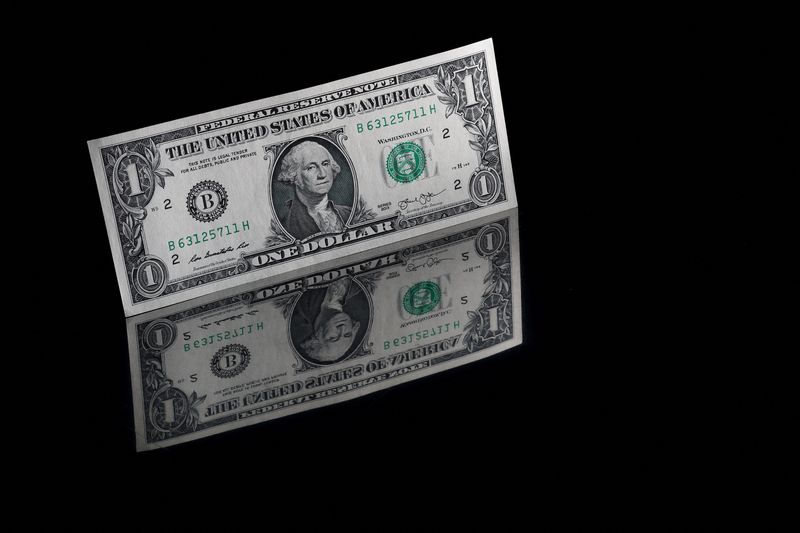By Herbert Lash and Amanda Cooper
NEW YORK/LONDON (Reuters) -The dollar fell on Friday as further declines in the shares of Credit Suisse and First Republic Bank (NYSE:FRC) rattled markets fearful of contagion and increased concerns that a recession lies ahead because of the impact of tighter monetary policy.
An early recovery in European stocks ran out of steam as investor sentiment remained fragile after a week of turbulence following the failure of Silicon Valley Bank on March 10.
U.S. banks have sought a record $153 billion in emergency liquidity from the Federal Reserve in recent days, while the $54 billion loan for Credit Suisse and $30 billion lifeline for First Republic failed to halt their stock declines. Credit Suisse fell 8% in Europe and First Republic tumbled 30%.
The dollar index, a measure of the dollar against six other currencies, slid 0.604% as traders waited for the Fed's two-day policy meeting that is expected to end with a one-quarter percentage point hike in interest rates on March 22.
Contracts for fed funds futures show a 61.3% probability that the Fed will raise rates by 25 basis points, according to CME's FedWatch Tool. Futures also show the Fed will have cut rates by July in a sign recession fears are mounting as the U.S. central bank tightens monetary policy to fight high inflation.
Whether the banking turmoil of the past week leads to an immediate recession is hard to say, said Mazen Issa, senior FX strategist at TD Securities in New York.
"It probably increases the probability that you do have a recession and perhaps it increases the probability that you may have a hard-landing scenario, a more severe recession dynamic," he said.
"Once you have one regional bank go down, households question whether or not the regional banks are in trouble, that's a natural human emotion to feel," he said.
Banking troubles revived memories of the 2008 financial crisis, when dozens of institutions failed or were bailed out with billions of dollars of government and central bank money.
Three smaller U.S. lenders, including First Republic, have had regulators and other banks step in to prop them up, while in Europe, Credit Suisse became the first major global bank since the financial crisis to get an emergency lifeline.
"There is a wait and see approach as to what will happen with the U.S. economy," said Ed Moya, senior market analyst at OANDA in New York. "Now we're not debating a‘soft landing, no landing.’ We're debating is it a mild or severe recession?"
The euro rose 0.66% to $1.0675.
The rescue of First Republic on Thursday initially boosted risk appetite on Friday as concerns about global banks eased, making way for surges in the Australian and New Zealand dollars.
Sterling last traded at $1.2192, up 0.70%, while the dollar fell 0.39% against the Swiss franc. Earlier this week, the franc plunged the most against the dollar in one day since 2015, when the Swiss central bank loosened its currency peg.
The Japanese yen, which tends to benefit in times of extreme market volatility or stress, strengthened 1.48% versus the greenback to 131.77 per dollar.
Japan's Ministry of Finance, Financial Services Agency and Bank of Japan officials met on Friday evening to discuss financial markets.
Masato Kanda, vice finance minister for international affairs, told reporters after the trilateral meeting that the government, the central bank and the banking watchdog would coordinate to ensure the stability of the financial system.
The Australian dollar, which often outperforms when investors are feeling optimistic, rose 0.81% to $0.671.
Currency bid prices at 3:09 p.m. (1909 GMT)
Description RIC Last U.S. Close Pct Change YTD Pct Change High Bid Low Bid
Previous
Session
Dollar index 103.7400 104.3900 -0.60% 0.242% +104.4400 +103.6800
Euro/Dollar $1.0677 $1.0611 +0.62% -0.36% +$1.0686 +$1.0611
Dollar/Yen 131.7650 133.7800 -1.49% +0.51% +133.7350 +131.5550
Euro/Yen 140.68 141.91 -0.87% +0.27% +142.2000 +140.1700
Dollar/Swiss 0.9255 0.9293 -0.38% +0.12% +0.9299 +0.9241
Sterling/Dollar $1.2194 $1.2110 +0.69% +0.82% +$1.2200 +$1.2103
Dollar/Canadian 1.3721 1.3722 +0.00% +1.28% +1.3773 +1.3679
Aussie/Dollar $0.6708 $0.6658 +0.79% -1.56% +$0.6724 +$0.6650
Euro/Swiss 0.9883 0.9859 +0.24% -0.12% +0.9911 +0.9841
Euro/Sterling 0.8754 0.8760 -0.07% -1.02% +0.8782 +0.8745
NZ Dollar/Dollar $0.6271 $0.6196 +1.20% -1.24% +$0.6277 +$0.6192
Dollar/Norway 10.6960 10.7700 -0.68% +9.00% +10.7660 +10.6700
Euro/Norway 11.4219 11.4211 +0.01% +8.84% +11.4412 +11.3507

Dollar/Sweden 10.4853 10.5049 +0.29% +0.74% +10.5515 +10.4430
Euro/Sweden 11.1910 11.1582 +0.29% +0.42% +11.2054 +11.1239